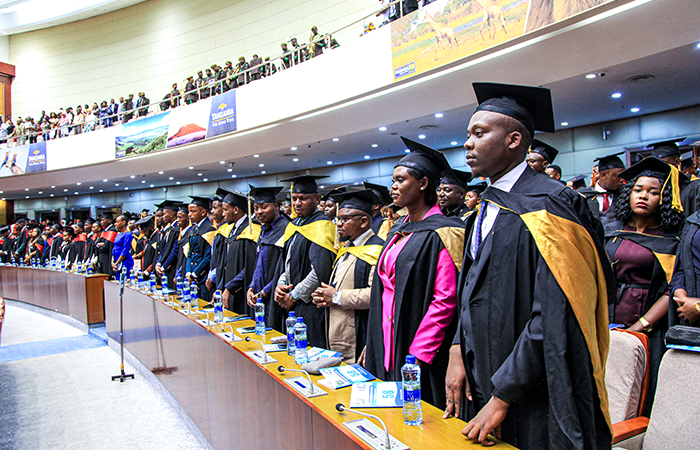
Education is a cornerstone of development, and in Tanzania, graduation marks a significant milestone in a student’s academic journey. Understanding the conditions required for graduation is essential for students, parents, and educators alike.
This article provides a comprehensive guide to the graduation conditions for Tanzanian students at various academic levels, ensuring you stay informed and prepared for success.
Graduation in Tanzania: An Overview
Graduation in Tanzania signifies the successful completion of a specific level of education, whether it’s primary school, secondary school, or higher education.
The process is governed by regulations set by the Ministry of Education, Science, and Technology, along with other educational bodies such as NECTA (National Examinations Council of Tanzania) and TCU (Tanzania Commission for Universities).
The conditions for graduation vary depending on the level of education but typically involve meeting academic, attendance, and sometimes extracurricular requirements.
Primary School Graduation Requirements
Primary school graduation is the first major milestone for Tanzanian students. To graduate, students must:
- Pass the Standard Seven National Examination (PSLE): Administered by NECTA, this exam assesses a student’s proficiency in subjects like mathematics, English, Kiswahili, science, and social studies.
- Complete the Required Attendance: Students must maintain consistent attendance throughout their schooling years.
- Meet Behavioral Standards: Schools often set behavioral expectations that students must adhere to.
Successful candidates proceed to secondary education based on their performance and available slots in public or private schools.
Secondary School Graduation Conditions
Secondary school graduation in Tanzania is divided into two phases: Ordinary Level (O-Level) and Advanced Level (A-Level).
O-Level Graduation Requirements
- Pass the Form Four National Examination: Conducted by NECTA, students must achieve a minimum grade in core subjects, including mathematics, English, and Kiswahili.
- Satisfy Coursework Requirements: Continuous assessment scores contribute to the final grade.
- Participate in School Activities: Extracurricular involvement, such as sports or clubs, is encouraged and sometimes mandatory.
A-Level Graduation Requirements
- Pass the Form Six National Examination: Students must perform well in their chosen subject combinations.
- Complete Community Service: Many schools require students to participate in community service as part of their curriculum.
- Adhere to School Regulations: discipline and active participation in school programs are often prerequisites.
Higher Education Graduation Conditions
Graduation from universities and colleges in Tanzania involves more complex requirements:
- Fulfill Academic Credits: Students must complete the required number of credits in their chosen program.
- Complete a research project or dissertation: This is a critical component of most undergraduate and postgraduate programs.
- Meet Internship or Practical Training Requirements: Some courses, especially in fields like medicine, education, and engineering, require hands-on training.
- Clear financial obligations: All tuition and related fees must be paid in full before graduation.
Additional Graduation Considerations
National Service Program (JKT)
For some students, particularly A-Level graduates, participation in the National Service Program (Jeshi la Kujenga Taifa—JKT) may be part of their post-graduation activities. While not mandatory for all, it remains a significant cultural and developmental program in Tanzania.
Special Needs Students
Tanzania ensures inclusivity by providing tailored graduation conditions for students with disabilities, allowing them to succeed within a supportive framework.
Challenges and Opportunities
While many students meet graduation conditions with ease, others face challenges such as financial constraints, lack of resources, or inadequate access to quality education. The Tanzanian government and various NGOs continue to work toward addressing these issues, offering scholarships, infrastructure improvements, and teacher training programs.
Conclusion
Graduation is a pivotal moment in the academic journey of Tanzanian students. By understanding the conditions and requirements at each educational level, students and their families can better prepare for success.
Whether it’s passing national exams, completing coursework, or engaging in extracurricular activities, meeting these conditions ensures a smooth transition to the next stage of education or career.
Stay informed, stay prepared, and embrace the opportunities that education in Tanzania offers.
Related articles
- Discover Tanzania University Semester Two Exam Timetable Today
- 10 Proven Strategies to Ace Your Semester One Exams in Tanzania
- The Ultimate Guide to Scoring High in Semester One Exams at Tanzanian Universities
- Semester One Exam Schedule for Tanzanian Universities: Key Dates and Updates
- UDSM Announces Research Scholarships for Climate-Smart Agriculture
- Ministry of Education Denies Changes to Kenya’s University Entry Requirements
- Prof. Carolyne Nombo Opens Key Stakeholders Meeting on Teacher Education
- UDSM-Sida Re-advertises PhD Sponsorship in Marine Sciences
- How Companies in Tanzania Empower Education Through Scholarship Sponsorships


